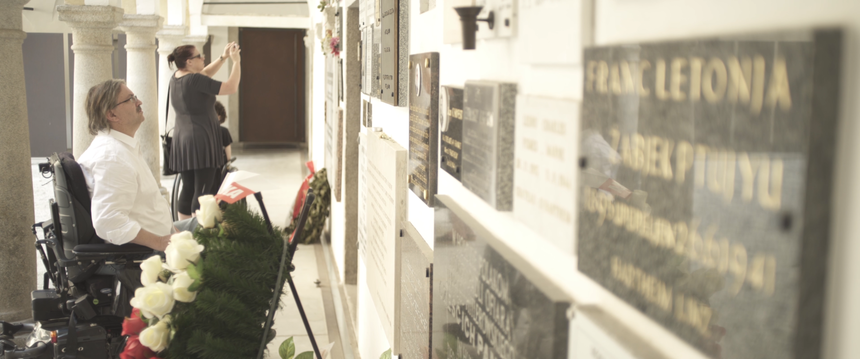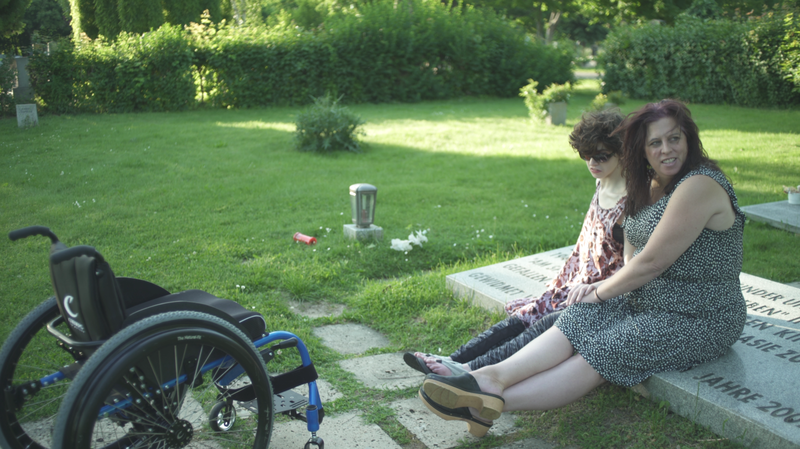Slamdance 2025 Review: DISPOSABLE HUMANITY, An Ignored Tragedy Brought to Life

There is one marginalized group to which any of us could become a member at anytime: the disabled. And there are no amount of supplements or devices that can completely overcome a disability, whether it be physical or mental, in societies that too often treat the disabled as afterthoughts or burdens, as people not worthy of living. Too often, disabled people's voices are left out of advocacy for the marginalized, perhaps precisely because that could be any one of us. We all like to believe that if we just take care of our bodies and minds, we'll be fine. But life doesn't work that way, and those whose voices we need to hear are ignored, not only in the present, but in their own history.
Cameron S. Mitchell, in his feature documentary debut, explores the past implications of disability hatred in Disposable Humanity. Winner of an Audience Award at Slamdance, he, David T. Mitchell, Emma Mitchell, and Sharon Snyder make a family journey to discover too-often forgotten victims of the Holocaust, the secret German government program called the Aktion T4 that started in 1939 that killed thousands of disabled people, how that history has been uncovered, and how it is represented (or arguably misrepresented).
The film begins with a stark reminder of how, even in a developed nation, disability is an afterthought, as David, a wheelchair user, has to be carried on and off a train due to the lack of a ramp. Such a simple object, it would seem, to allow people like David to more easily access the world, and save time and effort for train employees; and yet apparently it's too much to ask. This comes just after titlecards tell us of a Nazi program that killed more than 300,000 disabled people in six years. It might seem something of a welcome contrast—the 'simple' lack of a ramp compared to murder—but it's a reminder of the covert implication that we've not come nearly as far as we would like to believe.
So we're aware of how most societies still make it difficult for people with disabilities to live as freely as the abled. Then we're introduced to what happened in Germany in the late 1930s: how both adults and children with any sort of 'disorder' or condition that would require consideration, accommodation, assistance, were taken away from their families and placed in hospitals, often asylums, where they were experimented on, and finally exterminated. While their numbers might have been smaller in comparison to other groups killed by the Nazis, the disabled were among the first to be killed.
Mitchell uses his camera in a deceptively complex way; it seems at first to be somewhat neutral, presenting interviews with people in Germany and Poland who have found these histories, who have created museums and archives to expose what happened to the disabled under the Nazi regime, and with his father as central figure moving through these spaces, acting as the surrogate to the audience. But the complexity comes when we realize how that kind of seeming neutrality is how so much of these evil was allowed to happen. It perhaps must be neutral at points in order to contain the anger, the deep sense of loss, the frustration with what happened in the past, now in great danger of being repeated in the present.
And that balance of the past and the present is vital. The Mitchells show us people who have dug into their family's histories to learn of relatives who were killed in these programs, to see how the disabled were some of the first to 'disappear' because it was easier, without being a cohesively recognized national or ethnic group. We're shown how reports were misleading and death certificates falsified to hide what was being done to the disabled, and to complicate bringing the truth to light. The film also does not shy away from some gentle yet firm confrontation with members of the abled community who are effectively in charge of showcasing these histories of the forgotten, but that still means those who would have been forgotten, are not a part of making and maintaining these stories for future generations.
With Disposable Humanity, Mitchell crafts a strong story, harrowing in its history and contemporary implications, at once a kind of grassroots advocacy for forgotten people and ignored voices, as well as a study in how history is shaped and presented, if those whom it purports to represent are not in control of the narrative.








